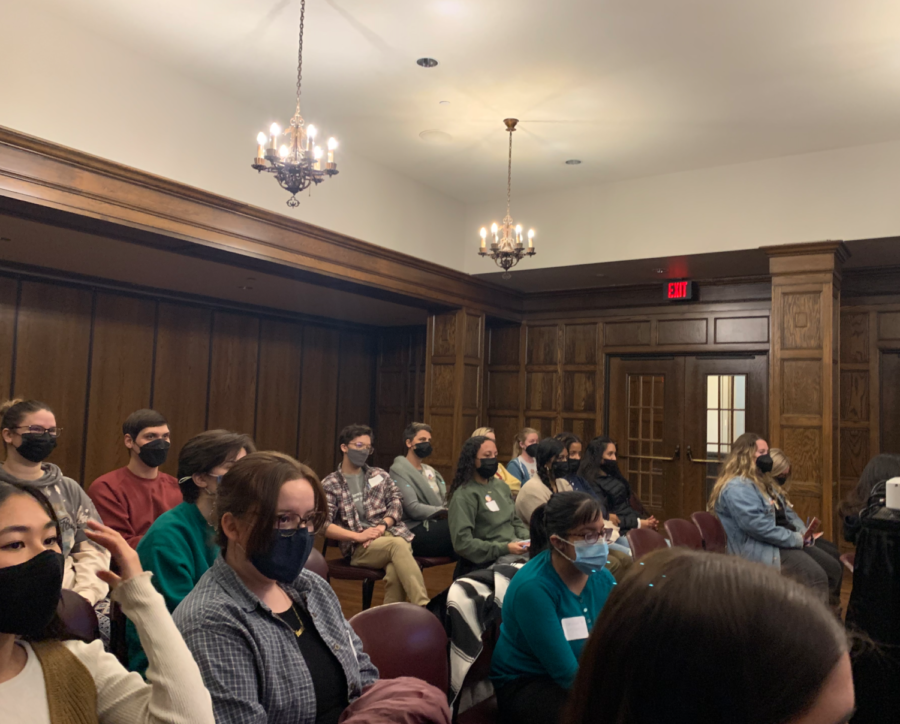Iowa State hosts 2022 Social Justice Summit: “Our Voices, Our Community”
Topics such as allyship and microaggressions were discussed at the 2022 Social Justice Summit.
February 2, 2022
Alyannah Buhman, director of diversity, equity and inclusion within the student government, was one of many students who furthered their journey towards social justice at Iowa State by attending the Social Justice Summit that took place on Saturday.
According to Buhman, a senior majoring in criminal justice and minoring in political science and sociology at Iowa State, social justice should be an important topic for everyone at Iowa State, whether they believe they can create change or not or whether they have been involved in social justice actions before.
“The main takeaway from the summit is that social justice is a learning curve. Wherever you are in your social justice journey, your mindset and awareness of perspectives other than your own is essential to creating an action plan,” Buhman said.
Buhman continued to state that the topic of social justice does not have to seem daunting, but can start by taking small steps.
“The action plan does not have to be drastic,” Buhman said. “It could be as simple as signing and sharing petitions or taking the time to listen and support marginalized individuals.”
Buhman also shared that social justice begins with one person.
“This event is extremely important to the culture at Iowa State because social justice starts with the individual,” Buhman said. “It provides the opportunity for students to educate themselves and get acquainted with faculty, staff and resources.”
The summit, whose theme was “Our Voices, Our Communities” and was in the Memorial Union, featured many of these social justice resources, including Iowa State staff and faculty, through different discussions and presentations throughout the day.
One of the speakers was Luan Nguyen, a graduate research assistant in the department of civil, construction and environmental engineering and the department of world languages.
Nguyen spoke on the topic of microaggressions and their effects at Iowa State.
“Microaggressions provide a way to normalize discrimination, leading to new forms of racism, sexism, homophobia, transphobia and ableism,” Nguyen said. “The subtleness of these microaggressions allows these new forms of discriminations to continue to be institutionalized, leading to the low retention rates of minoritized students in engineering education.”
Microaggressions are defined as “the subtle and stunning assaults that people face because of their membership in social groups such as race, gender and sexual orientation” on the Iowa State student engagement website.
Nguyen said microaggressions, which are often racial and gendered, affect nearly every identity at Iowa State, specifically students of color.
“Racial microaggressions specifically target students of color, with Black students reported to be the more likely targets of these microaggressive behaviors,” Nguyen said.
Nguyen also focused on how microaggressions affect students in STEM fields at Iowa State. According to him, this can lead some STEM students to consider changing their majors or even dropping out of college.
“In engineering, microaggressions lead to minoritized groups facing difficulty in developing their engineering identity, as well as in being seen as competent engineering students,” Nguyen said. “For example, women remain underrepresented in both STEM workforce and academia due to the hostile environment created by these microaggressions and other forms of discrimination.”
According to Nguyen, microaggressions are hidden in everyday interactions. Nguyen, who is from Vietnam, gave the personal example of being asked, “Where are you really from?”
“People tend [to] assume or try to guess where I’m from,” Nguyen said. “I have had people stop me in the middle of the road on this campus and just start speaking Chinese to me.”
Nguyen said one way that individuals can work to eliminate the use of microaggressions is by becoming aware of the experiences of others. According to him, by recognizing the experiences of others, the Eurocentric perspective on social justice can begin to shift.
Andra Castle, the assistant director of the Margaret Sloss Center for Women and Gender Equity, was another speaker at the summit.
Castle focused on the topic of allyship.
According to Castle, while allyship is a complex action, it all begins with the act of listening.
“To be an ally is not an identity someone can claim for themselves, but a series of actions someone does to advance equity for all people,” Castle said.
The idea of allyship being an action connects to what Buhman had to say about the idea of social justice. Buhman said one quote specifically resonated with her from a presentation by Toyia Younger, who was a keynote speaker at the event.
“I do not have the exact words, but it was something like ‘social justice isn’t equity or fairness. It isn’t providing equal opportunities to everyone, but rather removing all of the barriers that led us to needing assistance to reach these opportunities in the first place,’” Buhman said.
Buhman concluded by stating the importance of educating yourself about topics such as social justice so that change can begin to take place. She also said that while it might not be a quick process, even small steps towards change are important to take.
“Social justice is a life long learning process. You will make mistakes because it is like a math problem — trial and error,” Buhman said. “However, by not giving yourself that opportunity to grow and educate yourself, you are severely limiting your perspective in life.”

















